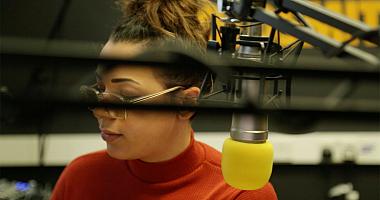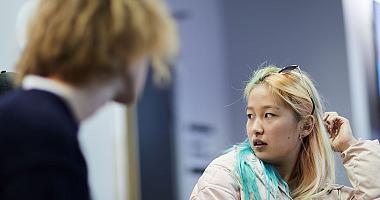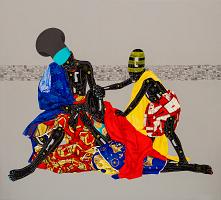MA
Journalism
Content navigation menu
Why study MA Journalism at Goldsmiths
Accredited with distinction by the Professional Publishers Association, this practical MA gives you the essential skills to work as a journalist for multiple audiences across myriad platforms.
- Journalism is about the world outside. It’s about the story and the people who make it. It’s about being on top of the zeitgeist. And being on top of the deadlines.
- The Department of Media, Communications and Cultural Studies has been ranked second in the UK for 'world-leading or internationally excellent' research (Research Excellence Framework, 2021) and 16th in the world (third in the UK) in the 2024 QS World Rankings for communication and media studies.
- This MA gives you the practical skills to work as a journalist at the highest level in print and online. We will learn what news means, and where it comes from. We will give you the ability to write compelling features and interviews. We’ll also be focusing on the kinds of questions you need to ask – of the individual, the state or the organs of power. And we address how the new digital world has transformed the way we go about journalism, adding new platforms and new technical skills.
- The programme is practice-based so you’ll be creating magazines and working on our local news website while you’re here. EastLondonLines is a live news site run from the Department of Media, Communications and Cultural Studies and covering a large area of East and South London. Working on ELL as a journalist will give you unrivalled hands-on experience of being part of an editorial team, finding and breaking news stories and features. You will have options to choose to learn data, video and podcasting skills as well as using cutting edge open source technology to investigate and present stories.
- You will work in a small group both during your editorial control period of Eastlondonlines and on your magazine project because working in such teams is common professional practice. Underpinning the practice-based work are more theoretical modules essential to give background – these cover media law and ethics, politics and public affairs, and journalism in context.
- You’ll discover how different mediums dictate how you create a story and how to adapt your style of writing to reflect the nature of the platform, from print newspapers to digital features. Join us and discover how to express yourself concisely, grab the attention of readers and think on your feet in this swipe-left-and-right world.
Contact the department
If you have specific questions about the degree, contact Terry Kirby.
Length
1 year full-time
Entry requirements
You should have (or expect to be awarded) an undergraduate degree of at least upper second class standard and have evidence of some journalism (or equivalent) experience.
Fees
Home - full-time: £13600
International - full-time: £25450
Department
Media, Communications and Cultural Studies

The MA has accreditation from the Professional Publishers Association, with the highest accolade of a 'distinction'. This is given by the PPA to reward programmes of the highest overall quality that achieve a distinction level in the majority of categories in the accreditation process.
What you'll study
The programme is divided into a series of modules that cover the key practical skills and theoretical background. There are no optional modules or alternate pathways.
Practice modules are largely assessed by portfolios of your work, while theory modules are all assessed by essays or written research work.
You'll study the following compulsory modules:
| Module title | Credits |
|---|---|
| News | 30 credits |
| Journalism in Context | 15 credits |
| Media Law, Regulation and Ethics | 15 credits |
| Power, Politics and Public Affairs | 15 credits |
| Features | 60 credits |
| Journalism Production | 15 credits |
| Journalistic Practice (Digital Methods) | 15 credits |
| Critical Social Media Practices | 15 credits |
Guest speakers
Additionally, a wide range of journalists and those associated with the media are invited to speak to and network with students through various strands of our guest speaker programme.
Speakers attend both individual modules – recent speakers on our Politics Power and Public Affairs module have been Toby Helm, political editor of The Observer and Andrew Grice, political commentator of the Independent – and more informal ad hoc visits.
Media Forum Series
We have other speakers and film screenings as part of our regular evening Media Forum Series run by the department for all students, where recent sessions have included the importance of local journalism, news start-ups, reporting in war zones, tabloid journalism, open justice and the media and race.
These events are usually followed by a drinks reception and the opportunity for students to meet informally with guests.
Student work
EastLondonLines
EastLondonLines is an independent news website run by the journalism team in the Department of Media, Communications and Cultural Studies. The site runs throughout most of the year and students on journalism programmes spend time working on the site, gaining valuable experience and building up their CVs. Students work in a variety of editing, production and reporting roles under the supervision of academic and technical staff.
It began in November 2009 as a means of giving students an opportunity to work as professional journalists in a real life environment where stories of national and international importance are regularly breaking. The area covered by the site is a large, diverse, multi-cultural and vibrant part of east and south London, with a population of more than one million people and ranges from inner city Hackney to Croydon on the southern borders of London and provides exciting and varied journalistic challenges.
Student reporters cover all types of stories – from local politics and courts, to community events, cultural and arts stories as well as breaking news such as crimes and demonstrations.
Entry requirements
You should have (or expect to be awarded) an undergraduate degree of at least upper second class standard and have evidence of some journalism (or equivalent) experience.
See the 'How to apply' section below for details of what you will need to include in your application.
International qualifications
We accept a wide range of international qualifications. Find out more about the qualifications we accept from around the world.
If English isn’t your first language, you will need an IELTS score (or equivalent English language qualification) of 7.0 with a 7.5 in writing and no element lower than 6.5 to study this programme.
If you need assistance with your English language, we offer a range of courses that can help prepare you for postgraduate-level study.
How to apply
Apply directly to Goldsmiths using our online application system
Before submitting your application you’ll need to have:
- Details of your academic qualifications
- The email address of your referee who we can request a reference from, or alternatively a copy of your academic reference
- Copies of your educational transcripts or certificates
- A personal statement – this can either be uploaded as a Word Document or PDF, or completed online. Please see our guidance on writing a postgraduate statement
You'll be able to save your progress at any point and return to your application by logging in using your username/email and password.
When to apply
There is no deadline for applications, however applicants are encouraged to apply early to avoid disappointment.
Interviews
Applicants who are considered suitable for the programme based on their application will be shortlisted to attend an interview, usually online.
Applicants who wish to visit campus and meet staff and students can visit during Open Days or make individual arrangements with the programme convenor, Terry Kirby, t.kirby(@gold.ac.uk).
Applicants who are selected for interview will be asked to complete some journalism exercises in advance.
Portfolios
We will usually ask to see a portfolio of your work, which should include evidence of published journalistic work, either in undergraduate student journalism or in the professional arena. You can also include evidence of journalistic or media work experience that has not resulted in published work.
Applicants without a portfolio can be considered for interview if they meet other selection criteria, including supplying an engaging personal statement. We may also ask some applicants without any journalism experience to undertake work experience in order to further understand how journalism operates in the workplace and to prepare themselves for the programme.
Personal statement
In your personal statement, we will be looking for evidence that you understand the programme and what studying at Goldsmiths is all about. We would also like you to demonstrate that you have an understanding and passion for journalism and what being a journalist involves.
You should cite your journalistic influences and media sources, as well as any relevant work experience in the field. You should also outline what you hope to achieve from the programme.
Find out more about applying.
Fees and funding
Annual tuition fees
These are the PG fees for students starting their programme in the 2025/2026 academic year.
- Home - full-time: £13600
- International - full-time: £25450
If your fees are not listed here, please check our postgraduate fees guidance or contact the Fees Office, who can also advise you about how to pay your fees.
It’s not currently possible for international students to study part-time under a student visa. If you think you might be eligible to study part-time while being on another visa type, please contact our Admissions Team for more information.
If you are looking to pay your fees please see our guide to making a payment.
Funding opportunities
Scott Trust Foundation Bursary
UK applicants for this programme are eligible to apply for the Scott Trust Foundation Bursary, which consists of:
- a bursary covering full tuition fees
- £5,000 subsistence allowance
Find out more about funding opportunities for MA/MSc Digital Journalism programmes. and use the Goldsmiths scholarships finder below to find out what other funding you may be eligible for.
Additional costs
In addition to your tuition fees, you'll be responsible for any additional costs associated with your course, such as buying stationery and paying for photocopying. You can find out more about what you need to budget for on our study costs page.
There may also be specific additional costs associated with your programme. This can include things like paying for field trips or specialist materials for your assignments. Please check the programme specification for more information.
Paying your fees
Find out about paying your tuition fees.
If you are a UK student you may be eligible for a postgraduate loan.
Meanwhile our Careers Service can also offer advice on finding work during your studies.
Professional accreditation
The MA Journalism is accredited by the Professional Publishers Association, with the new, highest accolade of a 'distinction' awarded to us. This is now given by the association to reward programmes of the highest overall quality that achieve a distinction level in the majority of categories in the accreditation process, which cover all aspects of the programme.
The inspection team commended the programme as 'exceptional' and said we produced 'highly motivated' students who were given 'excellent opportunities to produce real live journalism on Eastlondonlines', received 'formidable feedback' and a high level of day-to-day support in their studies. They also believed that we had achieved the right balance between introducing new digital techniques and teaching traditional core practices. And they were incredibly complimentary about the students themselves and the work they produce.






.jpg)
